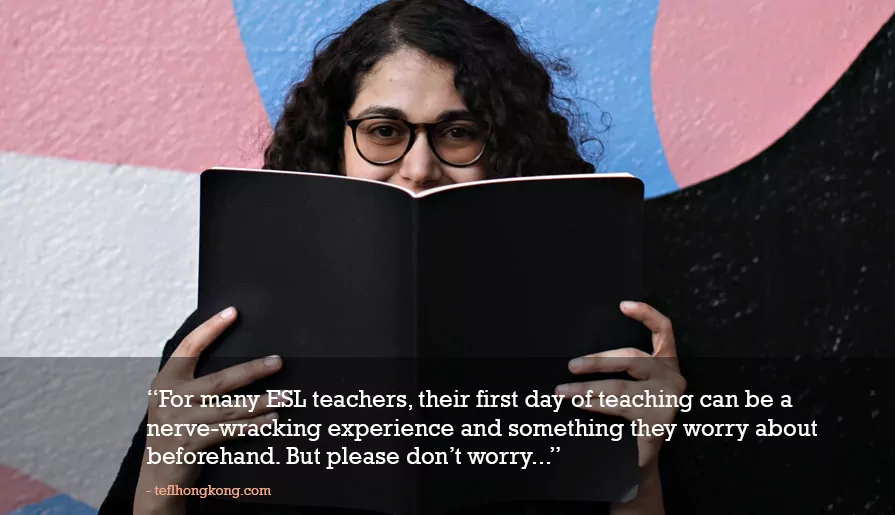
- By: Anna McIver
- In: For Teachers
Congratulations on completing your TEFL certification (CertTESOL, CELTA or a similar teaching qualification). Now the day has come that you’ve been waiting for – to actually handle an ESL classroom! All that you’ve learnt during the course – the teaching practice, the input sessions, feedback, lesson planning etc., will now come handy.
So, it’s your first day of teaching and with it your first class! For many teachers, this can be a nerve-wracking experience and something they worry about beforehand. But please don’t worry. In this article, we will provide some ideas and tips to help you prepare and feel confident (or at least not too anxious) when you teach your first class.
So let us start by addressing the “worries” followed by “tips”:
The worry: I have never taught anyone before! What if it all goes wrong?
This is the most common feeling many teachers experience. Our advice would be to stay positive, believe in your abilities, reflect through the sessions you’ve done during your training period. If you feel you need a little motivation, then speak to your colleagues and share your concerns. They will guide you and share some amusing, motivating stories based on their experience that will certainly make you feel confident.
Also remember, if it does go wrong for some reason, tomorrow is another day, and any problematic or unsuccessful class is an opportunity to reflect and make changes to future lessons.
The worry: What if the class ‘behaviour is poor or they don’t listen to me?
Concerns about behaviour are particularly prevalent with kids and teens classes, and poor conduct can really impact on a classes’ learning and progress as well as affect a teacher’s confidence and relationship with a group.
Before your first class you should ensure that you are aware of your school’s behaviour policy if they have one. If you feel it is an appropriate outline feel free to refer to it in the first class. It is important that all students know what to expect if poor behaviour occurs, while trying to strike the right ‘balance’ between being a ‘polite’ and ‘strict’.
Also, consider setting out agreed class guidelines which students devise themselves with your guidance during the first class – these can then be referred back to throughout the academic year.
Finally, focus on praise and positivity – rewarding positive behaviour goes a very long way to creating a happy classroom environment.
The worry: What happens if I finish my prepared class too early?
Luckily it is possible to be well prepared for this one! We suggest always having a backup plan for every class. This doesn’t need to be lengthy and detailed or even a written out plan and can be the same for multiple classes. In case students do finish early, and your lesson plan doesn’t stretch to fill the class time, have a list of prepared activities you can fall back on.
These could include:
- having a few conversation card sets ready to go for some impromptu speaking practice in pairs. This website provides a variety which covers a wide range of topics https://www.excellentesl4u.com/esl-conversation-cards.html
- printing some board games ready with counters and dice. If you hang on to these throughout the year, you can use them with many different classes. Some nice editable versions for kids and teens can be downloaded from http://www.eslgamesworld.com/members/games/printables/index.html
- downloading and saving a few general knowledge quizzes suited to different levels that you can use to fill some time as well as being educationally useful. http://iteslj.org/links/ESL/Quizzes/Trivia/ provides a big range of questions, and you’re sure to find something useful!
- making your list of ‘back up games’ to refer to so you are never caught out. This website provides lots of games that only require scraps of paper! https://www.tefl.net/elt/ideas/games/scraps/
The worry: What if I don’t have enough time to finish my prepared class?
In any class, it goes without saying that a teacher needs to be aware of the time. Not only what time it is of course, but also if an activity seems to be dragging on, or if students grasped a concept much more quickly than planned for.
If a particular grammar point or activity ends up taking much longer than you had prepared for don’t panic! Ultimately this is a good thing as you know that students need more time to practice and review that particular topic.
We suggest keeping an eye on the time, so you allow at least a few minutes to round off the class with a quick review while letting students know you will return to the theme again next class to finish off.
Timing activities and knowing how a class will manage different topic areas and grammar points come with experience, so don’t beat yourself up if you struggle with this area, to begin with.
The worry: What do I do if the lesson I prepared is too easy… or too difficult?
This is another area of concern that is common for new teachers and becomes easier with time. In cases where you’re unsure of a class’ level, a coursebook will help enormously. Although they may not all be at the same level, or they have more than likely had some test or diagnostic to be placed in the group, the course books content should work for them.
To support the weaker section or individuals considered a little different, you can provide the same tasks but with scaffolding in place to support the less able learners. For example, in a gap-fill task, you may provide a word list to choose from for those students. Similarly, in a writing task, you could give them sentence starters and phrases to include so they have a little more guidance. Checking in with them quietly during the class is also a good idea to see how they are getting on.
For individuals who seem to be streaking ahead, ask them to create their own examples of sentences based on a text or to consider what might happen next or provide their own opinion regarding a theme in a reading or speaking activity.
Having some ‘I’ve finished what do I do now?’ tasks at the ready will also avoid boredom and ensure focus. These could be in the style of thinking cards which contain a random scenario which students write or discuss their response. For example:
What would you do if you found the pot of gold at the end of the rainbow?
Would you rather wake up bald or with purple skin? .. and so on!
You can find a lot of activities and related resources online. Check a few ESL Games and Activities here!
Another right way to keep higher ability students busy is to ask them to write down a word for each letter of the alphabet and then choose ten words and write a story.
All these kinds of tasks depend on your class, of course, but we suggest having some ideas such as these ready to go just in case.
If classes are finding things too easy, then it is time to introduce further challenge into your lesson plan and try to push them a little further whenever possible. Consider adding in new vocabulary and introducing newspaper articles and so on to help them develop and make further progress.
Also Read: Interesting way to teach grammar
Final Thoughts: In conclusion, our best advice is to try to relax and enjoy teaching as much as you can. Like any job teaching English is a learning curve and some days will go well and others won’t! The most important thing is that you get to know your classes and plan accordingly. Don’t be afraid to try new things – they may work, they might not, but you won’t know until you try. We wish you luck with your career as an English teacher, and I hope you will be able to implement some of our tips and ideas in your own classroom.
Please Share:This article was published on February 24, 2020.
Courses We Offer:

1. CertTESOL: Certificate in TESOL
A level 5, initial teacher training qualification for new and experienced teachers, enabling you to teach English anywhere in the world. The course is equivalent to Cambridge CELTA.
Learn More
Developed by our Trinity CertTESOL experts, for a comprehensive, self-paced learning experience. Earn an internationally recognized certificate and master essential teaching skills, accessible globally 24/7.
Learn More